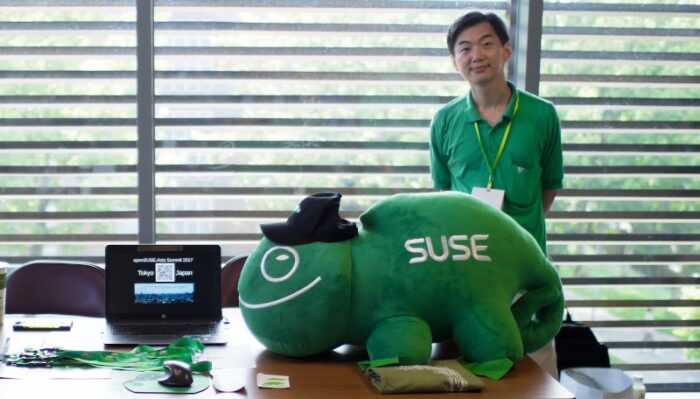Currently an experimental project, Slowroll is a hybrid distro that seeks to meld the stability of a fixed release distro like openSUSE Leap with the advantages of a rolling release like openSUSE Tumbleweed.

Article updated at 2:06 pm EDT 9/12/23.
openSUSE has introduced a new Linux distribution called Slowroll, which promises to be sort of a cross between distros released the old fashioned way, on a fixed release schedule like openSUSE Leap, and distros using the rolling release release model, in which the system is constantly kept up-to-date through constant updates, like openSUSE Tumbleweed.
With Slowroll, updates will happen, but on a slower schedule. As the folks at openSUSE put it, there will be “updates every one or two months, with bug fixes and CVE fixes as they come in.”
In other words, security patches will happen in real time, because it’s dangerous to kick the security can down the road, and and bug fixes will also happen immediately, because why take a chance on things breaking when there’s a fix for that. Other changes, however, will roll out on a monthly or slower basis.
This will offer a nice alternative for users who like the rolling release idea, which means you never have to go through the wash-rinse-repeat cycle of updating your OS after the version you’re using reaches end-of-life, but don’t care for the Russian roulette aspect of rolling releases, which puts software in your system that hasn’t been thoroughly tested on the nearly infinite variety of hardware combinations that exist in the wild.
Now, openSUSE devs can let changes perk in the wild for a while on Tumbleweed, giving them the opportunity to find and fix bugs discovered post release, before merging those changes into Slowroll. This should make Slowroll a bit more stable than Tumbleweed — probably not by much, but for some production uses, any degree of added stability might be welcome.
Part of Larger Changes at openSUSE
For the time being the distro is “experimental,” and while it’s obviously a work in progress at this point, this new distro definitely appears to be destined to be around for the long haul at openSUSE, which is in the process of changing the way it does things.
This has been necessitated by changes made at the project’s upstream, SUSE, which has been transitioning its flagship product, SUSE Linux Enterprise, to its new Adaptable Linux Platform. What this means is that openSUSE’s tried and true methods for developing Leap as a community version of SLE are largely going bye-bye.
This has led the project to consider new ways of developing the distro, and while this obviously puts pressure on openSUSE developers, it also opens the door for new products to emerge in collaboration with its user community, which has spoken through a recent survey conducted by the project, the results of which were released last week.
[Jonathan Corbet has written an in-depth look at what’s happening at openSUSE that was published on Thursday on LWN.net.]
Long story short: Slowroll is one result of what we might see from openSUSE as it regroups to deal with changes upstream.
Experimental or not, it’s ready for you to try now. All of the information you need to get it up and running is available on the openSUSE:Slowroll page on openSUSE’s wiki. If you decide to give it a try, please post about your experiences in the comments below. I, for one, would be interested in finding out how it works for you.
Editor’s note: Article updated at 2:06 pm EDT 9/12/23 to include new information.
Christine Hall has been a journalist since 1971. In 2001, she began writing a weekly consumer computer column and started covering Linux and FOSS in 2002 after making the switch to GNU/Linux. Follow her on Twitter: @BrideOfLinux







Unlike other rolling releases, Tumbleweed undergoes an intense test on openQA (openqa.opensuse.org). This takes away most serious issues before they hit the user base
Already, I tested many versions of Opensuse, not only Tumbleweed, but also others, not only inside Virtualbox, but also installing different versions of this system on a real computer.
Unfortunately, Opensuse is one of the slowest, bulkiest, and clunkiest version of Linux. According to its characteristics, my home computer is capable of working correctly and quickly with any version of Linux.
Therefore, as before, I remain with Arch Linux! 🙂
How many versions of openSUSE are they intent on creating? This would be, what, the fourth version after LEAP, Tumbleweed, MicroOS? Is this some sort of “make-work” for developers who should be spending their time fixing the open issues instead?
As for LEAP, that’s history. It’s no longer being developed for by just about anyone. Try to install any software whatsoever supposedly developed for openSUSE from the openSUSE software page. You’ll find “there is no official package for LEAP 15.5” – or 15.4 or any version except Tumbleweed. Nothing but “experimental” and “community” packages for everything else.
That’s why I upgraded to Tumbleweed a couple weeks ago. It’s a trade-off. Now I get updates almost every day, half of which require a reboot to be sure nothing is left behind, but at least I get the latest software and don’t have to wait years for, say, the latest browser like you do on LEAP. With the BTRFS snapshot feature, hopefully if the system breaks, I can easily recover.
Just to be sure, I’m going to do an image backup to an external SSD using fsarchiver. Trust no one and no one’s software.
Reminds me of Manjaro and Vanilla OS 2.0 Orchid’s take on slower periodical Arch and Debian Unstable.
This will hopefully have less issues and more maintained than Manjaro since this would be done by part of the same group as their faster-moving rolling release ‘upstream’, a team that seems to have done great if the good reviews I’ve heard of OpenSUSE is any indication.
Yes. Finally.
I have suggested this way of releases some 10+ years ago!
Thank you openSUSE. You are doing great job.
Maybe the best Linux distro I have seen and I have seen many.
And yes it is rpm! Yes, it has Yast!
Now after IBM things when RHEL and esecially CentOS are going to be somewhat dead to me and Fedora is doing stupid things like Ubuntu too… Not many options left to run a perfect development environment compatible with Enterprise. Go to openSUSE and SLES.